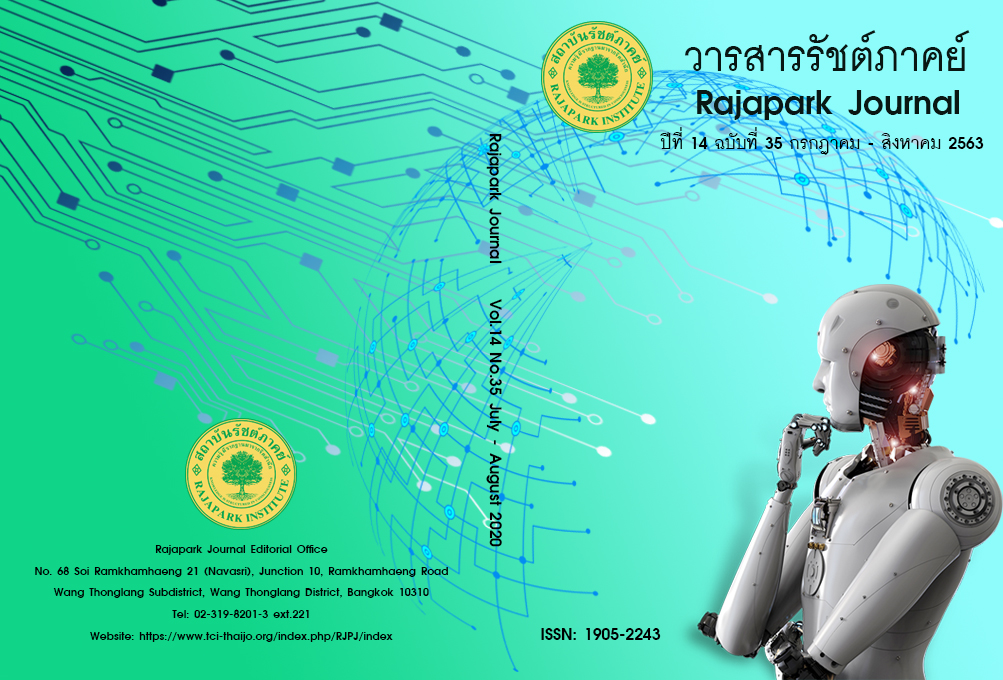Aggravated circumstances on the offence of murder due to religious hatred
Main Article Content
Abstract
It is universally accepted that everyone has freedom of belief and religion. In other words, the denial of freedom of belief and religion must not be allowed in any circumstances. This is evidenced in international law basis that protect such freedom and restrict the violation of the right to freedom of belief and religion. Thai society is recognized as one of the societies that widely accept every religion, or some people might recognize that there is a multi-religious coexistence in Thailand. Even though most Thai people are Buddhists, others who are not Buddhists are treated equally. Considering the importance of religion representatives whether a Buddhist monk, novice, holy man, clergyman, or religious leader of any religions, it can be seen that such persons have played important roles in the Thai context including contributing to preserve and maintain of their religions and contributing to promote peace in society. Accordingly, the objective of this research was to study the specific characteristic of Thai society giving precedence to such persons together with international concepts, especially the concept of hate crimes in order to show that an aggravated circumstance on the offence of murder of a Buddhist monk, novice, holy man, clergyman or religious leader of any religions due to religious hatred is necessary and should be introduced in Thai law. In this research the author has studied on many documents such as criminal provisions imposed for crimes against the concept of religious protection in several countries that there are many different forms including specific provisions, provisions of increasing the punishment and provisions that allow the court to apply a discretion for increasing the punishment and Thai laws relating to religious representatives such as Three seals Code of Law, The Penal Code of Siam R.S. 127 and The Sangha Act B.E. 2505. According from the study, this research has proposed that an aggravated circumstance on the offence of murder of a Buddhist monk, novice, holy man, clergyman or religious leader of any religions due to religious hatred should be added as Section 289(8) under the Thai criminal code.
Article Details
Views and opinions appearing in the Journal it is the responsibility of the author of the article, and does not constitute the view and responsibility of the editorial team.
References
Administration of Islamic Organizations Act B.E. 2540.
Barkan, S. E., & Bryjak, G. J. (2004). Fundamentals of Criminal Justice. Boston: Pearson Education, Inc.
Buaklang, S. (2016). State Neutrality and Freedom of Religion and Belief. Master of Laws. Thammasat University.
Charoenthanavat, K. (2019). Basic principles of public law. Bangkok: Winyuchon.
Constitution of the Kingdom of Thailand B.E. 2560
Fine Arts Department. (1993). The Story of the French Bishops in the Kingdom of Siam, Translated by Piengruthai Tuntithirawit. Bangkok: Fine Arts Department.
Herek, G. M. (1994). Heterosexism, Hate Crimes, and the Law. Violence and the Law, 89-112.
Khamdi, D. (2002). Theology. Bangkok: Kasetsart University Press.
Likasitwatanakul, S. (2014). The principle of Proportionality of Punishment, Raphi 2557. Published by Faculty of Law Thammasat University.15-17.
Mill, J. S. (1910). Utilitarianism Liberty and Representative Government. London & Toronto: J. Dent & sons LTD. And New York E.P. Dutton & Co.
Na Nakorn, K. (2017). General Criminal Law. Bangkok: Winyuchon Publication House.
OSCE Office for Democratic Institutions and Human Rights (ODIHR). (2009). Hate Crime Laws: A practical Guide. Warsaw: Polygrafus Andrzej Adamiak.
Saenguthai, Y. (1960). Determining a Penalty of an Offense in the Criminal Code. Dulpaha, 7, 931-935.
Saenguthai, Y. (1962). Criminal Code, Judicial Studies, Supreme Court, Part 1: Printed as a Memorial to the Royal Cremation of Phraya Legvanich Thamavitak at the Royal Cemetery, Wat Debsirindrawas Ratchaworawiharn.
Srisanit, P. (2018). Advanced Criminal Law. Bangkok: Winyuchon Publication House.
The Penal Code of Siam R.S. 127
The Sangha Act B.E. 2505


